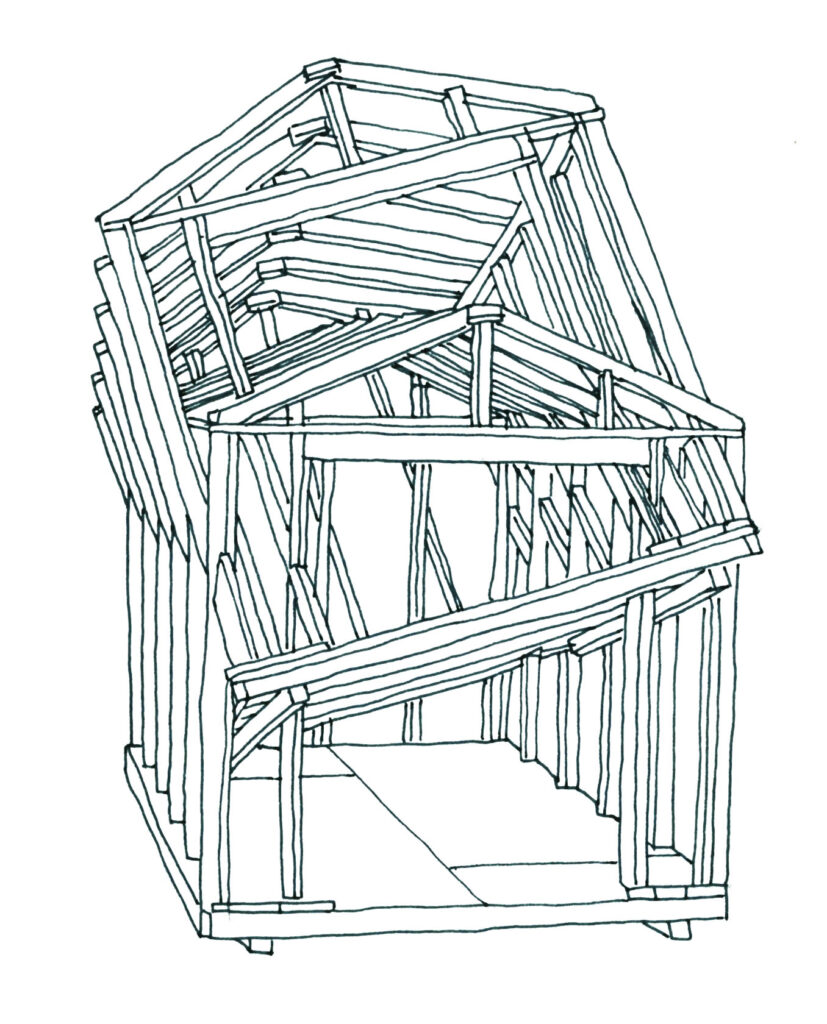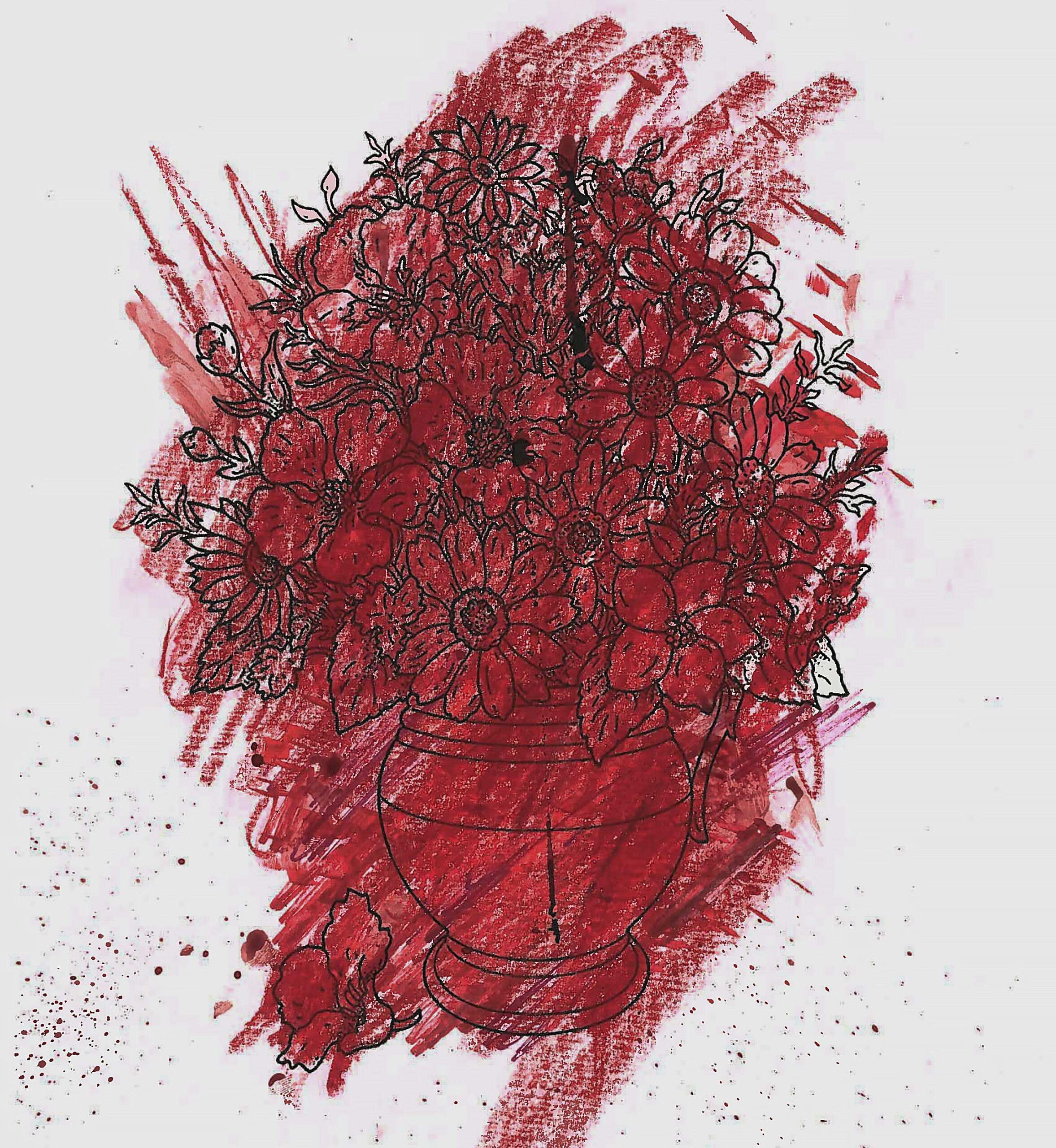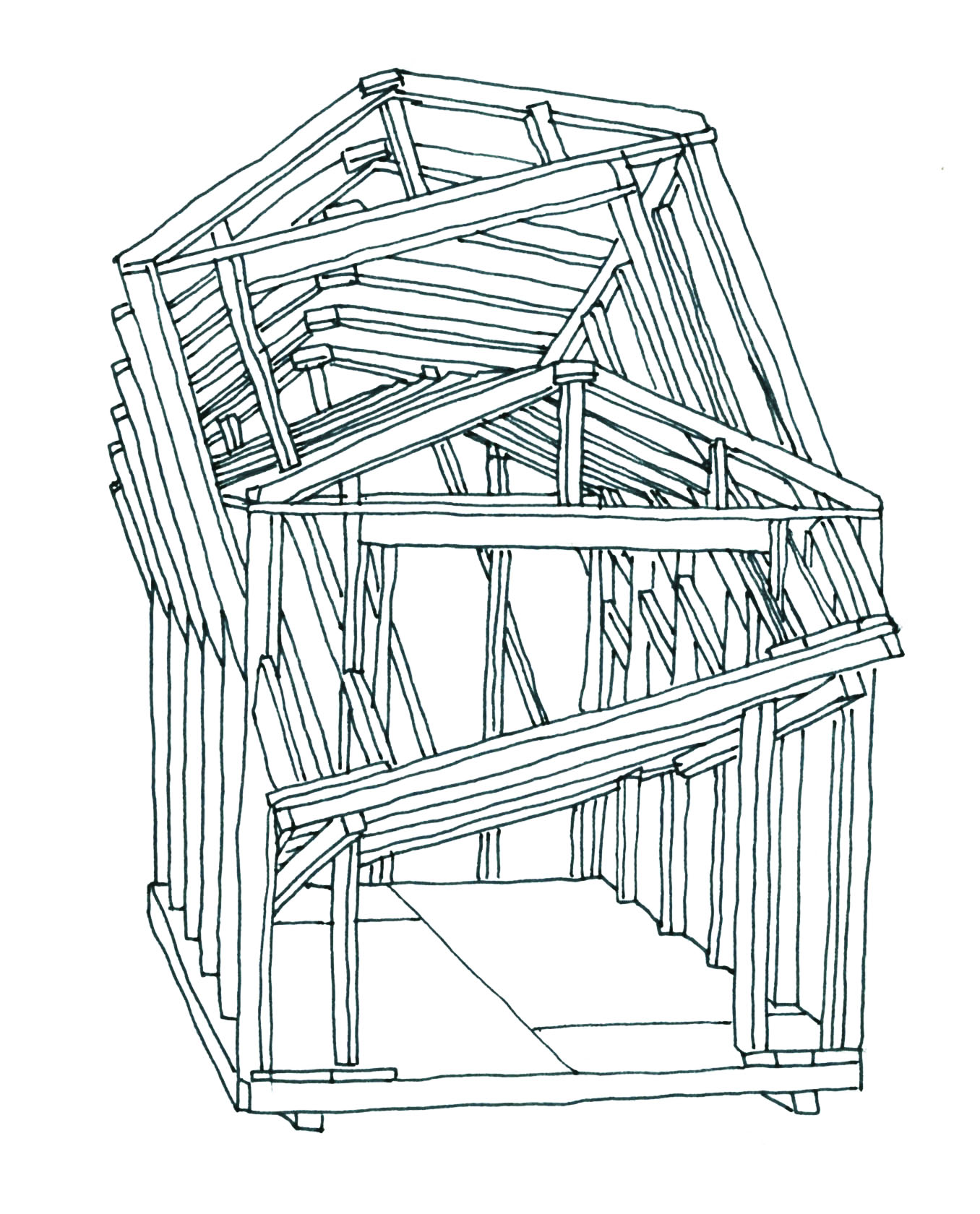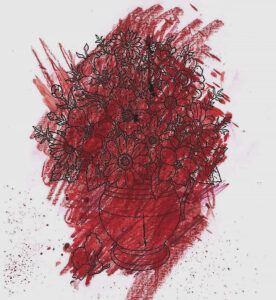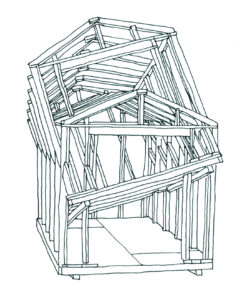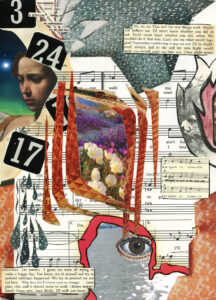Maytag
Chris Wiberg
Saturday morning Jane’s in her room with the Tribune, the washing machine chugging and sloshing beneath the floorboards. Heat and thunderstorms in the forecast for Thursday, coming in from Iowa; cold front moving in after. Makings of tornados. She hears a loud metallic grinding, a yawp from Mom, and the chugging stops.
Downstairs, Mom’s bent over the machine, pulling out sopping clothes, wringing them by hand.
“I don’t know what happened,” she says. “It just conked itself out.”
The washer is ancient. It came with the house, an old General Electric wringer machine. Hardly anyone even sells them anymore; everyone’s getting the automatic washers now. Jane starts draping Dad’s shirts on the clothesline. The whole basement smells like detergent, cut through with a burnt edge.
Feet come thumping down the stairs, and Dad is here, clompy shoes, undershirt, and suspenders; his face knuckled up like a confused fist that doesn’t know what to punch. “What are you two doin’ down here?” he wants to know, then his eyes land on the busted washer.
“I don’t know what happened!” Mom says. She starts the sentence calm, but on the last word her voice shoots up like a slippery soap bar, out of her control.
“You broke the machine?”
“She didn’t break it,” Jane says, plunging her arms into the water again, fishing for socks. “Look at the thing, it’s older than me.”
“Let me see .” Dad pulls the machine away from the wall, gets on his hands and knees and fiddles around the back of it until something snaps with a loud metallic echo. “God damn it!” He yanks himself back up to his feet.
Mom backs away, but he marches up to her face. They’re dance partners, matching steps until she hits the wall. Dad presses the leather soles of his shoes down on Mom’s bare toes, and sticking his thumb and forefinger into the tiny space between their faces, he pinches Mom’s nose and twists. Tears stream from her squeezed-shut eyes and Dad spits, “How stupid do you have to be to break a machine? You know what these damn things cost?”
Mom squeaks and Dad releases her nose but still hulks over her. “I’m out there hawking tulips to housewives just to keep ahead of the eight ball, and now this? This?”
Spinning on his heel, Dad stomps back up the stairs and out the front door. He doesn’t come back for hours.
*
Dad says they can’t afford a new machine and it’ll cost more than that to have a repairman come to the house. So now Mom does all the wash by hand. She spends her Saturday mornings bent over the washtub, her hands chapping and scaling. In the evenings making dinner, her hand goes constantly to the small of her back; she rolls her neck as she waits for the oven. Already she stands for most of the day at work.
Dad grouses about wasting his paycheck, but that isn’t what pays their bills. He’s only even worked at the garden center for six months, his first steady job in two years. Still, he found the money to buy a used four-door Buick Skylark because he needed it to get to work, he said. Mom still waits for the bus every day to take her to the Secretary of State Driver Services office.
When school lets out for the summer, Jane gets a job at the new Burger King on Rand Road. She works thirty hours a week taking orders at the register. One Tuesday evening in June, when she gets off work she rides her bike to Wieboldt’s Home Appliances for Less!, picks out a brand new, bright white 1968 Maytag automatic washing machine, signs a rental contract, schedules the delivery, and pays Mr. Wieboldt eight dollars for the first month—her own money, right out of her pocket. None of them have to worry now. Everything will be fine.
The truck pulls up on Thursday afternoon, when Jane is the only one home. Two boys just a couple years older than her set up the new Maytag in the basement. One of them, Jane recognizes from school. He graduated maybe two years ago, when Jane was a freshman. But they don’t talk because what’s for them to talk about? He has a job now; he’ll probably stay in Mount Prospect, Illinois for the rest of his life. After graduation, Jane will be out of here and never coming back. Thirteen months.
Jane signs the delivery order, the boy hands her a carbon copy, and she stuffs it in the manila envelope with the contract and the little book of payment coupons they gave her. The boys drive off to make their next delivery, and Jane turns on the radio to the pop music station and sits with the paper, listening to the Lettermen croon “Can’t Take My Eyes Off You” and looking for trouble in the forecast.
When Mom gets home, her face is damp from walking the three blocks from the bus stop. She says hi, passing the kitchen on her way to the bedroom to peel off the stuffy clothes she wears all day. Jane raps on the door and asks to come in, finding Mom lying on her back in her slip and brassiere, eyes closed as the box fan in the window blows across her knees.
“Mom? Can I show you something downstairs?”
When Mom sees the brand- new Maytag, she backs away like it’s a wild animal.
“Honey, you didn’t—your father said—”
“I used the money from my job,” Jane says.
“But you can’t afford—”
“Rent to own. That means once we make enough payments to buy it, it’s ours. Once I make enough payments,” she corrects herself.
Mom just needs to understand: Jane has money now. They don’t have to worry about what they can afford. There are so many things to worry about, but not this, not anymore.
“But sweetie, that’ll take years.”
“Two and a half years,” Jane says, “at eight dollars a month.”
“Eight dollars!” Mom presses her palm to her forehead. “Two and a half years!”
Upstairs, the door opens. Mom mutters, “Oh God,” and through the ceiling Dad hollers, “Hello-o-o!”
“Down here, Dad!” Jane calls back. Mom retreats to the corner by the furnace.
Clomping down the stairs, Dad sees the new Maytag and it’s like he’s looking at a Sasquatch in the middle of his basement.
“What the, what the?” he says.
“She meant well,” Mom pleads while Dad’s head swivels back and forth between the two of them and the washing machine.
“Janey, you had something to do with—?”
“It’s a rental, Dad.” Jane is almost as tall as her father, but she can’t remember standing eye to eye with him before. The muscles in his face rearrange themselves indignantly, his shoulders flex and his back straightens and he manages in this way to once again tower over her, a child. “Rent to own. I paid for it myself. Just eight dollars.”
“Eight dollars?” Dad is still baffled.
“Eight dollars a month, and after thirty months we own it free and clear.”
“Thirty months?” Dad cries. “Damn it, I said we can’t afford a new machine! I said it how many times?”
“It’s no obligation, we can take it back any time.”
“How many times, Jane!”
“It’s my money, I only spent my own money.”
“How. Many. Times.”
Dad has grown even taller somehow, face twisted into a Halloween mask.
Jane’s father has never hurt her.
“It is my. Own. Money.” Jane pushes her face up to his, and she sees white all the way around his pupils. His face spasms and in a second he’s set his eyes back boring into her, but for an instant—did she imagine it?—he looked shocked. Threatened?
With the sound of a whimper behind her, Jane remembers her mother’s presence, her position, her fear, but all Jane wanted to do was help!
“Dad?”
Jane’s father wheels back from her, jabs his arm out and points up the stairway.
“In the car!” he barks. “Now!” And stomps back up the stairs.
Jane has never seriously asked herself why her father won’t yell at her in front of her mother. Always he orders her out to the car, to dress her down in a private space where Mom can’t hear. She doesn’t ask, Is he ashamed? She doesn’t wonder, Is he afraid? She wouldn’t guess, Of what? And she has never, will not, must not, ask a question like: What would Mom do if she was there? Much less: What would Dad have to do to Mom?
Taking a look back at her shrunken mother, Jane turns and climbs upstairs and steps out the front door to the driveway, where her father waits in the driver’s seat of the ’62 Skylark he bought with his wife’s salary—the same salary the bank refused to consider when her parents applied for a mortgage.
Jane opens the passenger door, gets inside, and stares out the windshield at the house, listening to Dad breathe, waiting for him to unload.
But Dad isn’t saying anything. He sits in apneic silence. So Jane continues to wait, dropping her gaze to the dashboard; to her bare feet, grubby from the basement floor.
“I didn’t disobey,” she says. “You said, ‘We can’t afford a new machine.’ You didn’t say, ‘We can’t have a new machine.’”
No response comes from Dad, and Jane doesn’t know what to do, it’s never been like this before, but when she turns her head to face him, he’s doing something she’s never seen.
Gripping the steering wheel tight enough that the color bleeds from his knuckles, eyes screwed shut, tears stream down her father’s sandpaper cheeks. And just as Jane is about to speak—though she has no idea what she’ll say—his mouth wrenches open and disgorges a strangled, wet, mournful sound.
Dad rocks in the seat, pounding the steering wheel with the butt of his hand, Jane frozen in place next to him, and inside her a gate opens and she lets it flood her body, the thing she works so tirelessly to keep balled up in the hamper, screened behind the newspaper, crammed in the back of the dresser:
Fear.
*
There is so much more than this.
So much more to Jane, to her father, to her mother. To her family, her childhood, her life. There is so much more than this one moment so small it fits into the front seat of a Skylark, so small the corners of the ice cubes in the cocktail her mother began making her father when he and Jane went outside are still sharp when they come back into the house.
So much more: How two evenings later, as Mom cooks pot roast in the kitchen, Jane is stranded in the living room, blockaded in the easy chair behind the newspaper while her father, Tom Collins in hand, dances around the room with an invisible partner. He twists the knob on the radio to the point where “Cry Like a Baby” by the Box Tops hurts Jane’s ears, and as he sweeps across the room a splash of liquor lands on Jane’s forehead and she glowers at him over the top of the business section and he inflicts an expression he believes to be charming, mock-pleading with his eyes for her to get up and dance with him, but Jane will not move.
So much more: College. Another city in another state. A bigger planet than she ever thought to imagine. The tiny dorm room that feels huge and bare with just the few small boxes of things Jane wanted to bring from home. As they hug goodbye on move-in day, the gratitude in Mom’s eyes that she’ll understand only later.
So much more: Her mother’s second marriage and step-family in Rockford. In her twenties, in her first own car, Jane drives many times out and back on I-90, listening to the radio and every time an old song comes on, one from the sixties, her spine goes cold and she has to change the station.
Driving into the trailer park in Des Plaines where Dad lives in his later years, visiting to tell him she and her husband are expecting their first child. Dad is overjoyed, he even tears up a little, but Jane can’t help noticing how thin he’s become, how sallow, and he does not live to meet either of his grandchildren.
Her own marriage and divorce and the fight she has with her husband where he yells at her, Why do you do that? What, she says. Hide behind the newspaper, he says, and she stops—he actually reaches her, this isn’t where they split up. She says, I was doing that? I was doing that. He asks Jane, What’s going on? But she can’t say.
Her kids and their kids and the conversation she has decades in the future, so long from now that her two sons are both more than twice the age of that girl beside her sobbing father in the car. She has them over on a Sunday afternoon and tells them that since she retired she’s had time for a lot of thinking and not all of it has been easy, she’s been thinking about things she’d been avoiding for a long time. Your grandfather, she says, was a troubled man. An alcoholic, with undiagnosed depression and God knows what else. Your grandfather, she says, her breath curling up in her chest, was an abusive husband. An abusive parent.
She looks at her sons with tears in her eyes and her youngest says, Yeah, Mom, we know. Her eldest, eyes full of bafflement and concern, says, Didn’t you?
Her mother’s many long years getting older and older, moving farther and farther away, finally all the way out to the coast of California, where she slowly loses touch with the present moment, asking the same questions and having the same conversations over and over again, each time with an anticipation and innocence that slit Jane’s heart like a scalpel. Eventually the past begins to blink out too, like Christmas lights strewn among tiny wooden memories. A toybox, a Santa sleigh, a train car. A birthday, a family vacation, a Maytag washer: one by one, falling dark.
And the fear scuttling up Jane’s shoulders each time she herself reaches for a moment she knows is there but comes up empty. Being able to see, still, how much there is to lose—so much of everything that has ever been—but unable to stop it. She has seen, she has felt, she has lived, she has been so much.
And so much still untouched by the creep of time, the erosion of mind, the teeth of trauma. Like one marooned afternoon, just a handful of weeks after the washing machine and the car, when she gets off work early and rather than go straight home she rides her bike down Wolf Road to the garden center to look in on her dad, and she finds him there, showing an old lady down the aisles, laying an easy, affectionate hand on her shoulder to steer her to the succulents, which can thrive with little tending. His face breaking into a laugh at something the woman says. Satisfied, pleased with the work. Proud to be of service. This job he fumes is beneath him.
As he finishes with the customer Jane catches his eye and a moment arrives that could go either way and it breaks good, this time—his smile holds up, he beckons her over and says, Look at these hibiscus, have you ever seen such a brilliant pink? With two fingers, he lifts a blossom for her to admire.
And these, he shuffles her across the aisle, are called vinca. These ones here are purple, but you’ll find them in white, red, pink…
Jane says Dad I know that. I’m seventeen, I’ve seen flowers before.
Not like these! he says, adopting that face he thinks is charming. You’ve never seen flowers like the ones we have here. And Jane decides to let them both have this, and for she’ll never know how much time, her father walks her through the greenhouse, telling her the names of flowers.
*
One frigid morning in Jane’s dorm room in Michigan, her roommate comes in with the mail and hands her an envelope from Wieboldt’s Home Appliances for Less! Jane slides her finger beneath the flap and opens the envelope to find a typewritten check and a three-line note on store letterhead.
As of Jan. 11, 1971, you have paid in full for your Maytag Automatic Washing Machine. Enclosed is a refund in the amount of $8.00. Congratulations on your purchase, and please consider Wieboldt’s for your future home appliance needs.
Setting the check and the letter on her desk, Jane walks down the hall to the telephone by the stairwell and dials her parents back in Mount Prospect. Her father picks up on the third ring.
“Dad,” Jane says. “Hi, it’s me.”
“Janey?” Dad says. “It’s Sunday.”
“I know, Dad, I just—”
“We’re about to leave for church.”
“I’m sorry, I forgot, but—”
“Hold on, I’ll get your mother.”
“Dad, I wanted to tell you—”
But he’s already barking her mother’s name, warning her not to take more than a minute on the phone.
Jane hangs up the receiver, then takes it off the cradle and lets it dangle, the dial tone buzzing hollow. She slides down the wall and puddles herself on the floor, and everything around her—the hallway, the feet shuffling back and forth, the rest of her day, the rest of the world—fades into the muffled distance, fuzzy static surrounding an insistent, desperate, enraged voice inside her that screams: I am trying so hard to love you.
It echoes across her whole life. Every time she calls, every time she sees him; long after he’s gone, every time she thinks of him. It echoes so loud the vibrations go into her genes. Her children inherit it in their lives, in the ways they learn to be with people, in their desperateness to please, in the things that fall apart and how their hearts break and how they learn to put themselves back together and the things inside themselves they will never understand. She watches it all happen and she thinks of him sobbing in a car and of herself crying in a dorm hallway and of a white 1968 Maytag automatic washer, and these lonely dots of code pulse endlessly down through time.


